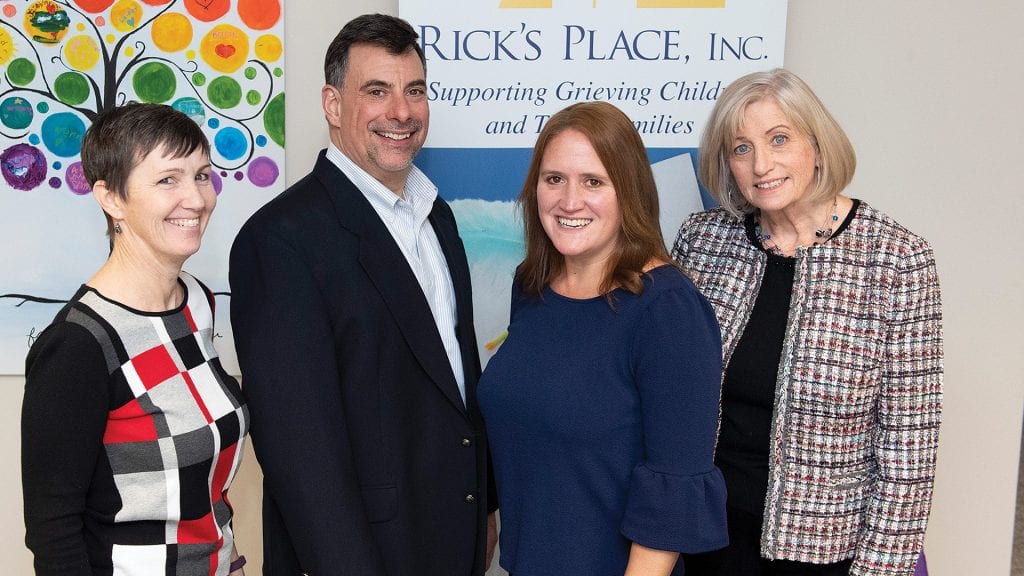Rick’s Place
This Nonprofit Is Finding New Ways to Provide a ‘Safe Place’

Kelsey Andrews (third from left, with Therese Ross, program director; Bill Scatolini, board president; and Diane Murray, executive director) calls Rick’s Place “a wonderful support system” — and much more.
Diane Murray says that, like most nonprofits, Rick’s Place is responding to the pandemic in a proactive fashion.
In other words, this agency, founded to provide peer support to grieving families, and especially children, has, out of necessity, changed, pivoted, and in some ways reinvented itself, said Murray, its executive director, noting that much of this involves carrying out its mission in a virtual manner.
“As soon as we became aware that it wasn’t safe to have in-person meetings, we moved to a virtual format for all our peer-support groups,” she told BusinessWest. And that was very successful. We were surprised at how well children made that transition; it’s hard enough to be grieving and talk about it in person with your peers, but looking at a screen can be tricky. But we sent them activities, and they would complete them and bring them to the meeting. It’s worked quite well.”
As she noted, grieving and talking about loss among a group of peers is hard, but it has become a proven method for helping children and families cope with the loss of a loved one. And Rick’s Place has been bringing people together in this way and providing what many call a ‘safe place’ since 2007.
Its mission, and its success in carrying it out — which made the agency the latest of several nonprofits to be named Difference Makers by BusinessWest — was summed up succinctly and effectively by Program Director Therese Ross when we spoke with her back in February.
“It’s a unique grief journey, but it’s also a universal experience,” she noted. “To hear from other people how they manage when their child says this or does that, it’s real boots on the ground, people living it, and it’s really helpful.”
Providing such help was the overarching goal for the many friends of Rick Thorpe, the former football star and 1984 graduate at Minnechaug High School who was among the more than 1,100 people who died in the South Tower of the World Trade Center on 9/11. He left behind his wife, Linda, and newborn daughter, Alexis. Searching for ways to memorialize Rick, friends and family members eventually turned to Alexis for inspiration and created a bereavement center in her honor.
In 2020, the work of this agency goes on, but obviously many things have changed, and in the meantime, new and different needs have emerged, said Murray, noting, as just one example, the restrictions placed on funeral services for the first several months of the pandemic.
“Deaths during the COVID era are so much more complicated for kids,” she explained. “Losing a grandparent or parent — and not being able to have the usual services you would have and seeing a large number of family and friends — has impacted the grief and made it more complicated. Also, in many cases, they didn’t get a chance to say goodbye, and that makes the process so much more difficult. We’re focusing on these COVID-era issues with families and giving them information on how to start that grief journey.”
Overall, though, a movement to virtual services has been the biggest change brought about by COVID-19, Murray noted, adding that, in addition to virtual peer sessions, the agency is also conducting virtual training sessions with local school systems on the impact of grief on students. Meanwhile, she and others at the agency are talking with area schools about taking the popular eight-week ‘grief groups’ it had been offering to a virtual format now that school has started up again.
“The schools are where we see our most diverse population and students with the greatest economic need,” she explained. “Finding a way to continue those virtually is very important to us. We’re talking to some school counselors who are very invested in getting our programs into the schools virtually.”
Since 2007, Rick’s Place and its loyal supporters — and there are many of them — have been invested in providing much-needed support to those who are grieving. In the COVID-19 era, the word ‘place’ has taken on new meeting. Now, in many cases, it’s not an actual, physical place, but rather … well, a computer screen where people can still gather. And where they can share, cope, and learn together.
As Murray said, the agency has had to pivot and in some cases reinvent. But its vital mission, one that has made it a Difference Maker, remains unchanged.
—George O’Brien





